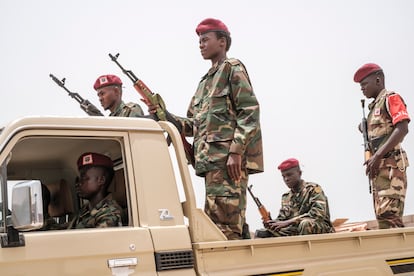The Sudanese army claims responsibility for shooting down an Emirati plane carrying dozens of Colombian mercenaries.


The Sudanese army claimed responsibility for downing a plane from the United Arab Emirates on Wednesday carrying nearly 40 Colombian mercenaries and a shipment of weapons believed to be intended to support the Rapid Support Forces (RSF) paramilitary group. The information was released by Sudanese state television, which reported that the aircraft was hit while attempting to land at Nyala Airport, a strategic city in the Darfur region in eastern Sudan and a stronghold of the paramilitary group, which has been fighting the army since 2023 in a civil war that has become one of the bloodiest ongoing.
After learning the news, Colombian President Gustavo Petro asked his country's ambassador to Egypt, Luz Elena Martínez, to determine how many Colombian mercenaries died. "There is unconfirmed talk of 40. We will see if we can return their bodies," the president wrote on his X account. According to information from the Europa Press agency, the Sudanese government—controlled by a military leadership—had information that the plane was about to take off from an air base in the United Arab Emirates, followed its route, and hit it with fighter jets. The objective was to send "a clear message against foreign intervention."
Tensions between Sudan and the United Arab Emirates are rising. In May, the Khartoum government severed diplomatic relations with the Arab country after claiming that the nation supplies weapons to the FAR, an accusation repeatedly denied by Abu Dhabi. The Emirates did not recognize this decision, considering that the statement issued by the so-called "Security and Defense Council" did not represent "the legitimate government of Sudan or its honorable people." Earlier on Wednesday, prior to the attack, Sudan's state news agency reported that the Gulf country had banned Sudanese planes from landing at its airports and denied one from taking off.
The Sudanese Foreign Ministry had also warned this week about the presence of Colombian mercenaries in the ranks of the FAR, stating that these actions represented "a threat to regional and international peace and security." However, the presence of mercenaries from other nations, such as neighboring Chad and Niger, has also been detected in Sudan. The arrival of former Colombian military personnel in that country had already been documented and exposed, among other media, by this newspaper in a report published in December . By the end of last year, it had been established that around 300 mercenaries had been recruited to fight alongside the FAR, of whom 20 Colombians were killed by suicide drones, also in the Darfur region.
Former Colombian soldiers , accustomed to fighting in jungles and mountains, are now fighting in the deserts of a foreign country. This is evidenced by the identity cards and passports found last year in Sudanese territory, which were the first clues to this phenomenon. Then, photos and videos began to appear on social media showing the soldiers posing with rifles and training young Sudanese. Faced with this evidence, President Petro acknowledged last November that there were Colombian mercenaries in Sudan. He explained that they were "deceived" men, who accepted offers to work abroad due to the poor conditions in the army, and who were sought out for their experience, a result of Colombia's decades-long internal conflict.
The experts consulted in the EL PAÍS report indicated that mercenary recruitment generally occurs through private security companies , which present themselves as operators of surveillance services in other countries and offer several thousand dollars for short-term work. Former military personnel agree, but are at the mercy of these companies, as they enter conflicts they are unfamiliar with, in countries with languages they do not speak, and with no return ticket. These are "one-person companies in which a retired general registers the business and promotes it through WhatsApp chains," explained Mario Urueña, a global security expert at the Universidad del Rosario, in the report. Many of the Colombians who traveled as mercenaries in Sudan have stated that they are there against their will, having been hired to work as security guards in the United Arab Emirates, more than 3,300 kilometers east of Darfur.
The former alliesThe civil war between the Army and the Rapid Support Forces, which involves other armed groups allied to each side, has plunged the country into what has come to be considered the world's largest humanitarian crisis. Amnesty International estimates that this conflict has caused the deaths of tens of thousands of people and the internal displacement of more than 11 million, in addition to leading to a situation of declared famine.
The parties now at war, however, were once allies. In 2021, they carried out a coup d'état that ended the democratic transitional government that ruled the country after dictator Omar al-Bashir was overthrown in 2019 following months of social protests. The transition to civilian rule and democracy has not materialized, something that is even more distant given the armed clashes that began in April 2023 and continue to this day.
EL PAÍS





